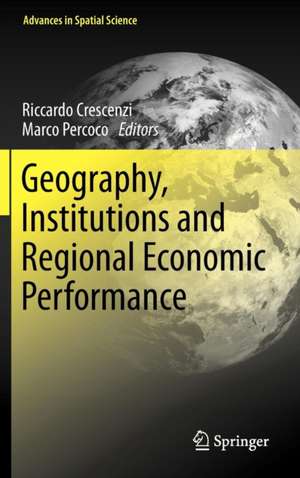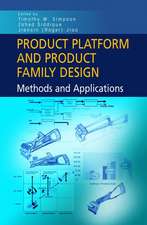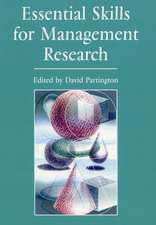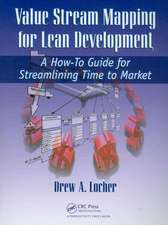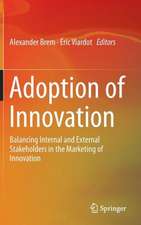Geography, Institutions and Regional Economic Performance: Advances in Spatial Science
Editat de Riccardo Crescenzi, Marco Percocoen Limba Engleză Hardback – 14 dec 2012
| Toate formatele și edițiile | Preț | Express |
|---|---|---|
| Paperback (1) | 647.73 lei 6-8 săpt. | |
| Springer Berlin, Heidelberg – 29 ian 2015 | 647.73 lei 6-8 săpt. | |
| Hardback (1) | 654.12 lei 6-8 săpt. | |
| Springer Berlin, Heidelberg – 14 dec 2012 | 654.12 lei 6-8 săpt. |
Din seria Advances in Spatial Science
-
 Preț: 368.92 lei
Preț: 368.92 lei - 18%
 Preț: 963.47 lei
Preț: 963.47 lei - 18%
 Preț: 948.16 lei
Preț: 948.16 lei - 18%
 Preț: 947.67 lei
Preț: 947.67 lei - 18%
 Preț: 940.72 lei
Preț: 940.72 lei - 18%
 Preț: 954.45 lei
Preț: 954.45 lei - 15%
 Preț: 646.62 lei
Preț: 646.62 lei - 18%
 Preț: 959.50 lei
Preț: 959.50 lei - 18%
 Preț: 956.33 lei
Preț: 956.33 lei - 18%
 Preț: 949.23 lei
Preț: 949.23 lei - 15%
 Preț: 646.75 lei
Preț: 646.75 lei - 15%
 Preț: 643.99 lei
Preț: 643.99 lei - 18%
 Preț: 955.40 lei
Preț: 955.40 lei - 15%
 Preț: 643.00 lei
Preț: 643.00 lei - 15%
 Preț: 644.49 lei
Preț: 644.49 lei - 18%
 Preț: 953.35 lei
Preț: 953.35 lei - 18%
 Preț: 956.03 lei
Preț: 956.03 lei - 15%
 Preț: 647.27 lei
Preț: 647.27 lei - 15%
 Preț: 638.24 lei
Preț: 638.24 lei - 18%
 Preț: 961.23 lei
Preț: 961.23 lei - 18%
 Preț: 954.93 lei
Preț: 954.93 lei - 15%
 Preț: 643.48 lei
Preț: 643.48 lei - 18%
 Preț: 955.70 lei
Preț: 955.70 lei - 15%
 Preț: 650.86 lei
Preț: 650.86 lei - 15%
 Preț: 650.04 lei
Preț: 650.04 lei - 15%
 Preț: 648.42 lei
Preț: 648.42 lei - 18%
 Preț: 949.42 lei
Preț: 949.42 lei - 18%
 Preț: 960.30 lei
Preț: 960.30 lei - 18%
 Preț: 948.29 lei
Preț: 948.29 lei - 18%
 Preț: 958.07 lei
Preț: 958.07 lei - 18%
 Preț: 950.66 lei
Preț: 950.66 lei - 18%
 Preț: 956.03 lei
Preț: 956.03 lei - 15%
 Preț: 643.65 lei
Preț: 643.65 lei - 18%
 Preț: 956.99 lei
Preț: 956.99 lei - 18%
 Preț: 956.81 lei
Preț: 956.81 lei - 18%
 Preț: 958.73 lei
Preț: 958.73 lei - 18%
 Preț: 959.98 lei
Preț: 959.98 lei - 18%
 Preț: 952.40 lei
Preț: 952.40 lei - 15%
 Preț: 643.00 lei
Preț: 643.00 lei
Preț: 654.12 lei
Preț vechi: 769.55 lei
-15% Nou
Puncte Express: 981
Preț estimativ în valută:
125.18€ • 130.21$ • 103.34£
125.18€ • 130.21$ • 103.34£
Carte tipărită la comandă
Livrare economică 14-28 aprilie
Preluare comenzi: 021 569.72.76
Specificații
ISBN-13: 9783642333941
ISBN-10: 364233394X
Pagini: 444
Ilustrații: VIII, 436 p.
Dimensiuni: 155 x 235 x 29 mm
Greutate: 0.8 kg
Ediția:2013
Editura: Springer Berlin, Heidelberg
Colecția Springer
Seria Advances in Spatial Science
Locul publicării:Berlin, Heidelberg, Germany
ISBN-10: 364233394X
Pagini: 444
Ilustrații: VIII, 436 p.
Dimensiuni: 155 x 235 x 29 mm
Greutate: 0.8 kg
Ediția:2013
Editura: Springer Berlin, Heidelberg
Colecția Springer
Seria Advances in Spatial Science
Locul publicării:Berlin, Heidelberg, Germany
Public țintă
ResearchCuprins
Space, Growth and Development.- Institutions and Culture.- Agglomeration Economies, the Location of Economic Activities and Innovation.- Geography in Motion: Trade, FDI and Migrations.
Notă biografică
Dr Riccardo Crescenzi is Programme Director of the MSc in Local Economic Development and Lecturer in Economic Geography at the Department of Geography and Environment at the London School of Economics. He is also affiliated to the LSE Spatial Economics Research Centre. Before joining the LSE, Dr Crescenzi was a Jean Monnet Fellow at the European University Institute (Florence). He was also a visiting scholar at the LSE and University of California, Los Angeles (UCLA). His research is focused on regional economic development and growth, innovation and EU development policies analysis. He has published in international journals, such as “Growth and Change”, “Regional Studies”, “The Journal of Economic Geography” and “The World Economy”. His teaching focuses on the economics of local and regional development.
Dr Marco Percoco is Assistant Professor in Urban, Regional and Transport Economics at the Department of Institutional Analysis and Public Management at Università Bocconi in Milan. He is also Deputy director for International Relations of the Centre for Regional Economics, Transport and Tourism (CERTET) at the same university. Dr Percoco serves in the board of the Italian Regional Science Association and in SR-Italian Journal of Regional Science. His research forcus on local development and transport economics.
Dr Marco Percoco is Assistant Professor in Urban, Regional and Transport Economics at the Department of Institutional Analysis and Public Management at Università Bocconi in Milan. He is also Deputy director for International Relations of the Centre for Regional Economics, Transport and Tourism (CERTET) at the same university. Dr Percoco serves in the board of the Italian Regional Science Association and in SR-Italian Journal of Regional Science. His research forcus on local development and transport economics.
Textul de pe ultima copertă
The book brings together contributions by scholars from several countries and different “sister” disciplines (Economic Geography, Urban and Regional Economics, Innovation Studies) with different approaches to the same crucial issue: how geography, culture and institutions influence regional economic performance. It includes a number of relevant insights into these complex relations covering different-though complementary-streams of literature in order to emphasize their points of contact and areas of consensus (or disagreement).
The role of institutional and cultural factors in shaping regional economic dynamics is analysed together with the impact of clusters, accessibility, urbanization processes and localised inter-firm linkages. The dynamic interactions of economic agents across space are also explored in depth by analysing the geography of trade flows, labour and capital mobility. Empirical analyses cover the whole European Union with some chapters focused on specific European countries but also on non-European and emerging economies.
The book effectively demonstrates that regional development is a complex and multifaceted phenomenon, the in-depth understanding of which calls for the simultaneous consideration of a variety of phenomena and the structural characteristics of places and agents. The understanding of regional economic performance hence calls for an explicit consideration of both “hard” and “soft ” factors of development, especially in terms of geography, culture and institutions.
The role of institutional and cultural factors in shaping regional economic dynamics is analysed together with the impact of clusters, accessibility, urbanization processes and localised inter-firm linkages. The dynamic interactions of economic agents across space are also explored in depth by analysing the geography of trade flows, labour and capital mobility. Empirical analyses cover the whole European Union with some chapters focused on specific European countries but also on non-European and emerging economies.
The book effectively demonstrates that regional development is a complex and multifaceted phenomenon, the in-depth understanding of which calls for the simultaneous consideration of a variety of phenomena and the structural characteristics of places and agents. The understanding of regional economic performance hence calls for an explicit consideration of both “hard” and “soft ” factors of development, especially in terms of geography, culture and institutions.
Caracteristici
The book offers an explicit analysis of the role of geography and institutions for local development It offers a significant coverage of EU countries and emerging economies Agglomeration economies and innovation are explicitly linked to immeterial (human-related) factors Includes supplementary material: sn.pub/extras
